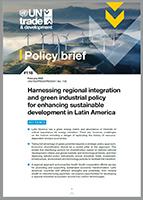
UNCTAD Policy Brief No. 118
Latin America, endowed with a rich renewable energy matrix and abundant critical minerals, is well-positioned to embark on green transition.
Sowing the seeds for a greener future, however, requires its economies to think about energy transition not simply in terms of carbon mitigation but also in terms of overcoming hurdles to green economic transformation.
This brief discusses the importance of industrial policy and of regional integration aimed at exploiting complementarities.
Key points:
- Latin America has a green energy matrix and abundance of minerals of critical importance for energy transition. There are, however, challenges on the horizon including a danger of replicating the history of resource-dependent enclave economies.
- Taking full advantage of green potential requires a strategic policy approach. Economic diversification should be a central pillar of this approach. This entails first identifying sectors for diversification based on defined national development criteria and global markets and technological trends, and then deploying tailored policy instruments across industrial, trade, investment, infrastructure, environment and technology policies to facilitate the transition.
- A regional approach and proactive South-South cooperation efforts are key for promoting and supporting sustainable economic transformation. Latin American countries with different strengths and potentials, from mineral wealth to manufacturing expertise, can explore opportunities for developing a regional industrial ecosystem around low-carbon technologies.
Harnessing regional integration and green industrial policy for enhancing sustainable development in Latin America - UNCTAD Policy Brief No. 118 (UNCTAD/PRESS/PB/2025/1)
26 Feb 2025


